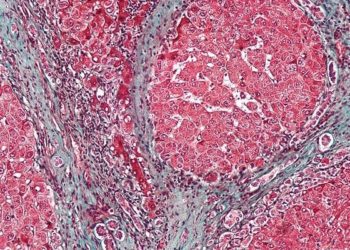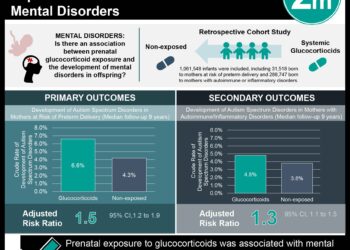Prednisolone and pentoxifylline do not reduce mortality in alcoholic hepatitis [STOPAH trial]
1. In patients with severe alcoholic hepatitis, treatment with prednisolone or pentoxifylline did not significantly reduce mortality at 28 days. Moreover, these treatments did not reduce mortality or the need for liver transplantation at the 90-day or 1 year timepoints.
2. Patients treated with prednisolone experienced significantly higher rates of infections compared to those who were not.
Evidence Rating Level: 1 (Excellent)
Study Rundown: Alcoholic hepatitis is a form of acute alcoholic liver disease that may result from prolonged and excessive alcohol consumption. Maddrey’s score is a commonly used prognostic tool to assess the severity of alcoholic hepatitis, which helps clinicians in determining whether or not such patients should be treated with adjuvant pharmacotherapy in the form of glucocorticoids or pentoxifylline. Previous randomized controlled trials have compared the effects of prednisolone and pentoxifylline with placebo in alcoholic hepatitis, though the results have been inconsistent. Moreover, little evidence exists comparing steroids and pentoxifylline directly in the treatment of alcoholic hepatitis, and the available results are conflicting.
The Steroids or Pentoxifylline for Alcoholic Hepatitis (STOPAH) trial sought to determine whether 28 days of prednisolone or pentoxifylline would alter short- and medium-term mortality in patients with severe alcoholic hepatitis. In summary, treating patients with severe alcoholic hepatitis with either prednisolone or pentoxifylline did not significantly reduce mortality at 28 days. Moreover, these treatments did not significantly reduce mortality or the need for liver transplantation at 90 days or 1 year, though treatment with prednisolone was associated with significantly higher risk of infection.
Click to read the study, published today in NEJM
Relevant Reading: Prednisolone with vs without pentoxifylline and survival of patients with severe alcoholic hepatitis: A randomized clinical trial
In-Depth [randomized controlled trial]: This multicenter, randomized controlled trial employed a 2×2 factorial design. A total of 1103 patients were recruited from 65 sites from across the United Kingdom. Patients were included if they were ≥18 years of age, were clinically diagnosed with alcoholic hepatitis, consumed >80 g/day of alcohol for men or >60 g/day for women, had a serum bilirubin >80 μmol/L, and a Maddrey score ≥32. Exclusion criteria included jaundice for >3 months, cessation of alcohol consumption >2 months prior to randomization, the presence of other causes of liver disease, renal failure, active gastrointestinal bleeding, untreated sepsis, or requirement of inotropic support. Eligible patients were randomized to one of the following treatment arms: 1) placebo, 2) prednisolone 40 mg daily, 3) pentoxifylline 400 mg three times daily, 4) both prednisolone and pentoxifylline. All patients were treated for 28 days and the primary endpoint was 28-day mortality. Secondary endpoints were mortality or liver transplantation at 90 days and 1 year. All patients were followed for 12 months or until they died.
At 28 days, there was no significant difference in mortality when comparing patients who were treated with pentoxifylline with those who were not (OR 1.07; 95%CI 0.77-1.49; p = 0.69). There was also no difference in 28-day mortality when comparing patients treated with prednisolone and those who were not (OR 0.72; 95%CI 0.52-1.01; p = 0.06). Moreover, neither treatment impacted mortality or the need for liver transplantation at 90 days or 1 year. The risk of infection was significantly higher in patients treated with prednisolone (p = 0.002).
Image: CC/Wiki/Nephron
©2015 2 Minute Medicine, Inc. All rights reserved. No works may be reproduced without expressed written consent from 2 Minute Medicine, Inc. Inquire about licensing here. No article should be construed as medical advice and is not intended as such by the authors or by 2 Minute Medicine, Inc.







